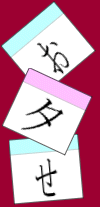|
If you really are one of those lucky JETs heading our way, then a big "Congratulations" is definitely in order. This section is written especially for you - your own personal reference book to stuff you need to know!
Living arrangements
The Board of Education organises just about everything for you, and for those things they don't, they'll be happy to help you out if possible. They supply basic (not new) items for each apartment - futon, sheets, pillow, television (sometimes bilingual - see our Guide to bilingual TVs), answer-phone, refrigerator, gas stove, washing machine, vacuum cleaner, iron, and a kerosene heater for winter. These are enough to keep you going for a while, but you'll probably want to splash out on extras fairly soon (you'll certainly be able to afford to). If you want to save some money, you can buy items from retiring JETs before you arrive (see the For Sale page listing items being sold by those leaving in July), search the second-hand goods shops, or of course buy items new. The International Association in Yahata also has a notice board offering handy items for sale. Quite often there are spare videos, futons, etc., being thrown around by foreigners leaving Kitakyushu, so it's worth trying there first. P.S. Your toilet will be western-style (who really prefers Japanese style anyway?).
Financial arrangements
We get paid on the 20th of every month, so your first complete payday will be August 20th, although you'll get a small salary payment around the end of July for the days you've been in Japan. So you'll need a little money to last you in Tokyo (try at least ¥30000), but once you get to Kitakyushu city (and the shinkansen ticket will be covered by the BOE), you shouldn't need to worry. You won't need much to keep you going through to payday, when you might want to splash out a bit more, so you can concentrate properly on nights out instead! The BOE organises for a bank account to be opened in your name soon after arrival, into which your salary is directly deposited, and from which utilities bills are withdrawn. When tax time comes around they'll also give guidance if they can. However since the interest rate at banks is practically non-existent, and the Fukuoka Bank branches are usually confined to Kyushu, most of us found it useful to open a national Post Office account too (we'll help with this). Note that credit cards are extra, and quite expensive, while cheques don't exist at all - but fortunately sending money home is very simple, and very cheap. You might have heard numerous times that living in Japan is a great deal more expensive than living in your home country, but we would like to qualify this - not if you're British! It's pretty similar actually. So when you budget living costs it usually works out like this monthly:
Salary after deductions for rent and social services payments: approx. ¥240000.
Utilities payments: usually no more than ¥20000 plus phone.
As you can see, that leaves you with ample funds to play with. So don't worry about it!
Japanese study
You'll be presented with more language study books by the JET programme than you'll know what to do with, so don't bring that one with you. There are of course plenty of copies of used textbooks no longer needed being handed down by ALTs. Apart from the initial course being run at Kitakyushu University for ALTs, you'll be left to your own devices to study further. Some ALTs attend evening classes run by the International Association at really low cost, while others are far too lazy! To start you off you'll find it really useful to learn the two easy alphabets, hiragana and katakana, since with these two you've a reasonable chance of being able to read restaurant and bar menus. This is a great deal easier than it sounds, and can take as little as 3 hours to learn one alphabet (several ALTs can testify to this), with a little tutoring - see our Guide to learning Hiragana.
Transport
As already mentioned, you might want to consider buying a bicycle either used or new soon after you arrive, because Kitakyushu is well suited for them, and also because we get travel expenses paid by the Board of Education based on public transport ticket costs. They can be picked up pretty cheaply second hand, or brand new for about ¥20000 upwards. A helmet is something you might also consider, although it's not essential. Some of us own small 50cc motorised scooters, which are simple to ride, although bad taxi drivers are a hazard. You should get an international licence if you plan to use a scooter here (but get one anyway; they're useful to have) - see the Guide to Used Scooters.
Clothes
Summer here is so humid that you won't want to wear more than one layer, so you won't need to bring too many clothes for immediate use. However during the winter months our unheated apartments do get quite cold, so you'll need lots of layers. Spot the problem? That's right, you'll either have to bring winter clothes with you, or buy them here. We really don't suggest bringing mountains of clothes with you to Tokyo, because you'll be heaving them around for a day or two. One sensible solution is to have items forwarded to Japan by sea, so they arrive shortly after you've settled (or much later). For those of you who haven't been given apartment addresses; you don't need to panic. You can either leave them with family or friends, and have them forward parcels after you've arrived, or you can contact us and forward them to a holding address here. We can probably take a best guess at your likely apartment location, so one of us can probably look after parcels for you.
Sorry, but this runs onto another page.....
|
|




